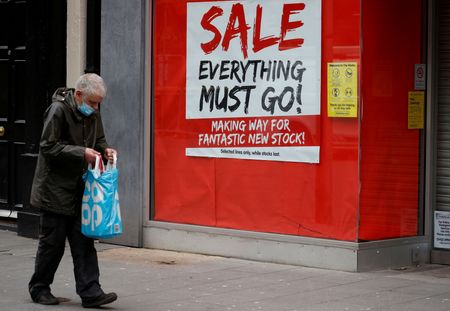 1
1 1
1



By David Milliken and William Schomberg
LONDON (Reuters) – Britain’s economy unexpectedly shrank 0.1% in March after a slump in car sales due to supply-chain problems, marking a weak end to the first quarter of a year when the risk of recession is looming.
Gross domestic product grew by 0.8% in the first three months of 2022, the Office for National Statistic said – below the 0.9% forecast by the Bank of England and the 1.0% expected on average by economists polled by Reuters.
Despite falling short of expectations, the growth between January and March is likely to mark a high point for the year, with consumer spending facing its biggest squeeze in decades.
Last week, the BoE forecast inflation will go above 10% in the final quarter of the year, up from 7% in March, which was already more than three times its 2% target.
“The economy had less momentum than we thought even before the full hit from the cost of living crisis has been felt. The risk of recession has just risen,” Paul Dales, chief UK economist at Capital Economics, said.
Prime Minister Boris Johnson’s government is under pressure to provide more support to households to tackle soaring bills for energy and other essentials that have already caused a near-record fall in consumer sentiment.
“Our recovery is being disrupted by (Russian President Vladimir) Putin’s barbaric invasion of Ukraine and other global challenges, but we are continuing to help people where we can,” finance minister Rishi Sunak said following Thursday’s data.
CONSUMER SLUMP
Britain, unlike some of its European neighbours, has limited direct trade ties with Russia, but it is heavily impacted by the jump in energy prices in Europe that were already high even before the Feb. 24 invasion.
The BoE has raised interest rates four times since December, and is likely to increase them further this year to tame inflation.
The world’s fifth-biggest economy shrank by a historic 9.3% in 2020 and grew by 7.4% in 2021, the sharpest swing in output of any G7 economy during the COVID-19 pandemic.
Overall GDP, on a monthly basis, is now 1.2% above its pre-COVID level of February 2020.
However, a large part of the recovery reflects greater spending on healthcare – up 11% since the start of the pandemic – while consumer services are still 7% below their pre-pandemic level.
In March alone, sales of cars and motor vehicles slumped by 15.1%, leading to a 0.2% fall in overall services output.
The fall in GDP would have been even greater had it not been for an unusually strong 1.7% rise in construction output, reflecting repair work after winter storms in February.
On Wednesday, Britain’s National Institute of Economic and Social Research (NIESR), a think-tank, forecast GDP would fall in the third and fourth quarters, meeting the technical definition of a recession.
Last month, the International Monetary Fund predicted Britain would see the weakest growth and highest inflation of any major advanced economy next year.
(Reporting by David Milliken and William Schomberg; Editing by Kate Holton and John Stonestreet)